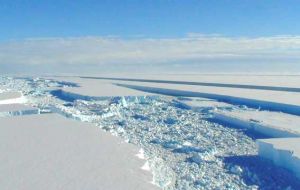MercoPress. South Atlantic News Agency
Antartic: Wilkins Ice Bridge Breaks

An ice bridge which held a vast Antarctic ice shelf in place shattered at the weekend and could herald a wider collapse linked to global warming, a leading scientist has warned. “It's amazing how the ice has ruptured. Two days ago it was intact,” said David Vaughan, a glaciologist with the British Antarctic Survey.
A satellite picture from the European Space Agency showed that a 25 mile-long strip of ice believed to pin the Wilkins Ice Shelf in place had splintered at its narrowest point, about 500 metres wide.
The Wilkins, now the size of Jamaica, is one of 10 shelves to have shrunk or collapsed in recent years on the Antarctic Peninsula, where temperatures have risen in recent decades apparently because of global warming.
The satellite image showed a jumble of huge flat-topped icebergs in the sea where the ice bridge had been on Friday. Mr Vaughan, who landed on the flat-topped ice bridge in January in a ski-equipped plane said change in Antarctica was rarely so dramatic. It was his first – and last – visit to the area.
In January, the remaining ice bridge had been surrounded by icebergs the size of shopping malls, many of them trapped in sea ice. A few seals were visible lolling on sea ice in the low Antarctic sunshine.
The loss of the ice bridge, jutting about 20 metres out of the water and almost 100km (62 miles) wide in 1950, may now allow ocean currents to wash away far more of the Wilkins shelf. “My feeling is that we will lose more of the ice, but there will be a remnant to the south,” said Mr Vaughan. Ice shelves float on the water, and can be hundreds of metres thick.
Nine other shelves have receded or collapsed around the Antarctic Peninsula in the past 50 years, often abruptly like the Larsen A in 1995 or the Larsen B, further north, in 2002. Cores of sediment on the seabed indicate some of these ice shelves had been in place for at least 10,000 years.
Temperatures on the Antarctic Peninsula have risen by up to about 3C in the past 50 years, the fastest rate of warming in the southern hemisphere. “We believe the warming on the Antarctic Peninsla is related to global climate change, though the links are not entirely clear,” Mr Vaughan said. Antarctica's response to warming will go a long way to deciding the pace of global sea level rise.
About 175 nations have been meeting in Bonn, Germany, since 29 March 29 as part of a push to negotiate a new treaty ahead of the United Nations Climate Change Conference in Copenhagen, from 7 to 18 December of 2009. The current talks end on Wednesday.
The loss of ice shelves does not affect sea levels – floating ice contracts as it melts and so does not raise ocean levels. But their loss can allow glaciers on land to slide more rapidly towards the sea, adding water to the oceans.
Greenpeace reaction
The reported shattering of the ice bridge connecting the Wilkins ice shelf to Antarctica was a complete contrast to progress on global action, Greenpeace said today from Bonn, where negotiations on a new climate deal start their second week tomorrow.
«The breakup of this ice shelf is in vivid contrast to the glacial pace of the international climate negotiations, where governments are trying to avoid acting responsibly - and bickering about who’s at fault,» said Stephanie Tunmore of Greenpeace International
«Let’s have some real leadership here, starting with a commitment from industrialised countries to cut emissions by 40% by 2020 and followed by concrete measures to support developing country efforts to decarbonise».
This year's series of talks are due to culminate in a global deal at December'sClimate Summit in Copenhagen.
«As climate change in the real world becomes more visible by the day, the rarified ‘bubble’ of the climate talks continues to produce nothing but hot air. This has got to change, right here, right now.




Top Comments
Disclaimer & comment rulesCommenting for this story is now closed.
If you have a Facebook account, become a fan and comment on our Facebook Page!